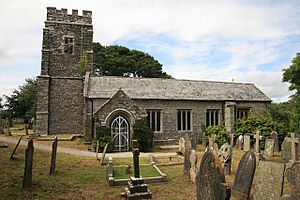St Cyricius and St Julietta's Church, St Veep facts for kids
Quick facts for kids St Cyricius and St Julietta's Church |
|
|---|---|

St Cyricius and St Julietta's Church, St Veep
|
|
| 50°21′55.4″N 4°37′0″W / 50.365389°N 4.61667°W | |
| Location | St Veep, Cornwall |
| Country | England |
| Denomination | Church of England |
| History | |
| Dedication | Cyricus and Julitta |
| Administration | |
| Parish | St Veep |
| Deanery | Trigg Minor and Bodmin |
| Archdeaconry | Bodmin |
| Diocese | Truro |
| Province | Canterbury |
St Cyricius and St Julietta's Church is a very old church in St Veep, Cornwall. It is a Grade I listed building. This means it is considered a very important historical building in England. The church belongs to the Church of England.
Contents
History of the Church Building
The church building has a long and interesting past. It was first built a very long time ago. In 1269, it was dedicated to Saint Veep. At that time, it had a cross shape. This early church was connected to Montacute Priory in Somerset. Sadly, none of that first building remains today.
Rebuilding and New Dedication
The church was rebuilt in 1336. When it was finished, it was given a new dedication. It was then named after Saint Quiricus and Saint Julietta. The tall tower at the west end of the church was built around this time. Most of the rest of the church was built later. This happened in the late 1400s or early 1500s.
Scientists used a method called dendrochronology to study the wood. This method looks at tree rings to find out how old wood is. They found that the roofs of the main part of the church were built around 1460. The roof of the north aisle was built even later, around 1540.
A Time of Change
In 1549, there was a big event in England called the Prayer Book Rebellion. During this time, some people in Cornwall faced difficult situations. This included Richard Bennet, who was the vicar of St Veep church.
Lost and Found Treasures
Churches often have valuable items, like special silver cups. Some of the church's old silver items were kept safe at a bank. For a while, they were thought to be lost. But in 2015, these treasures were found again! They were discovered in a storage place near Glasgow. The items included a silver cup from 1579. There was also a silver tankard from 1737 and a silver plate from 1738.
Church Organ
The church has a special musical instrument called a pipe organ. This organ was greatly improved in 1871. The work was done by a company called J.W. Walker and Sons. You can find details about this organ in a special list called the National Pipe Organ Register.
Church Bells
The tower of St Cyricius and St Julietta's Church holds a set of six bells. All these bells were made in the year 1770. They were cast by a company called Pennington and Company. What's really special is that these bells were made right in the churchyard! They are also unique because they are a "Virgin Peal." This means they came out of their molds perfectly tuned. They didn't need any extra work to sound just right. This is the only known example of such a peal in England.
 | Bayard Rustin |
 | Jeannette Carter |
 | Jeremiah A. Brown |

